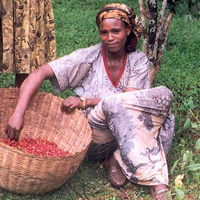Late last month, Mitiku Kassa, Ethiopia's agriculture minister, appealed to the international community for $175 million in emergency food aid to feed the 6.2 million people who are in the grip of severe drought there. Since famine killed 1 million Ethiopians 25 years ago, the country has remained in a cycle of drought-driven crises keeping it dependent on foreign aid. The U.S. is no stranger to assisting Ethiopia: It provides nearly 80 percent of food aid delivered to the country and began food shipments in anticipation of the government's latest request.
But while food aid addresses the immediate need, feeding people after they're hungry exacerbates dependency and contributes to poverty. It substitutes for preparedness and makes absorbing the next shock less manageable.
Instead, the goal for Ethiopians is self-sustainability, and one way to achieve that is to address food stability on a micro level. The ripple effect of assistance in a crisis year -- or even merely a bad growing season -- can mean an individual won't be able to regain productivity easily. A farmer might end up shut off from credit, taking on debt he can't repay, or selling off equipment and livestock to survive. And that means he can't produce in the eventuality of a later good or average growing season. Drought potential, too, can scare off investments in farming even when the growing season is good.

